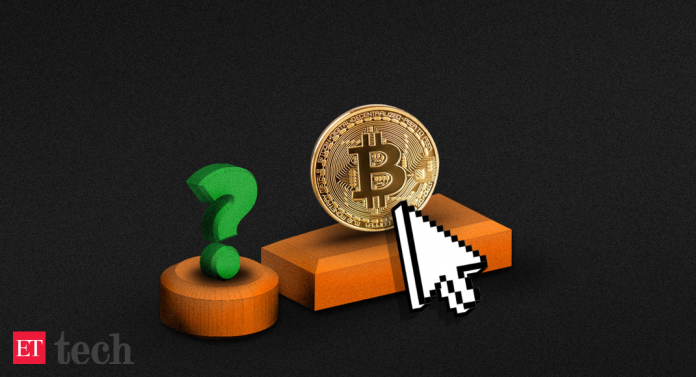First up, while some blockchain and crypto funds are rethinking their strategies in case the government bans cryptocurrencies, others remain bullish, pinning their hopes on innovation-friendly rules. Meanwhile, the Indian Premier League has left franchises fuming by banning them from striking deals with cryptocurrency firms. And finally, Aviral Bhatnagar, founder of A Junior VC, explains how creators and NFTs are fuelling the digital renaissance.
Also in this letter:
- Column: Startups, stay sharp, but grow up
- Tech firms step up campus hiring as attrition spikes
- Upstox valuation may top $3 billion in new round
Some crypto funds rethink strategies, others cling to hope
Amid speculation that India is set to ban cryptocurrencies, a few blockchain and crypto-focused funds are rethinking their investment strategies.
Though the broader crypto community feels a ban is unlikely, some funds are erring on the side of caution. They are planning for contingencies to ensure they do not face a situation like in 2018, when the Reserve Bank of India banned banks from providing services to the crypto community.
On hold: Early-stage venture fund Amesten Capital, which has invested in a handful of Indian projects in the decentralised finance (DeFi) and non-fungible tokens (NFT) space, paused its investments in November following reports the cryptocurrency bill would be introduced in the winter session of Parliament.
“We are still unclear on the playbook set by the government; if there are certain terms which may hurt innovation in the space, the builders will choose to move out and we will also have to,” Amesten Capital cofounder Sachin Jain said.
More than $500 million in risk capital has flowed into Indian startups in the crypto and blockchain space in 2021, compared to less than $40 million last year, we reported in October. The bulk of it has come from foreign investors.
A ban would tarnish perceptions and possibly hinder investments, said Akshay Aggarwal, cofounder of Blocumen Studios and Blockchained India, through which he facilitates investments by marquee funds in India’s crypto sector.
The flip side: A few venture capitalists who have seen many cycles of regulatory uncertainty remain bullish about their prospects in India and are pinning their hopes on the government unveiling innovation-friendly regulations.
“I expect them to regulate for any nefarious activities which is undoubtedly needed but support this fast-growing asset class of the modern era as well as empower local talent base to push India to the forefront of the new digital world,” said Saurabh Sharma, general partner, Jump Capital, which was an early investor in crypto exchange and unicorn CoinDCX.
Industry body warns against crypto ban: A blanket ban on cryptocurrencies would encourage non-state players, leading to more unlawful usage of such currencies, the Blockchain and Crypto Assets Council (BACC), a part of the Internet and Mobile Association of India (IAMAI), said on Thursday.
The remark comes as the government is set to introduce the Cryptocurrency and Regulation of Official Digital Currency Bill, 2021 for consideration and passing in the upcoming winter session of the parliament.
Quote: “The council has always argued in favour of prohibiting the usage of private cryptocurrencies as a currency in India by law since usage as currency is likely to interfere with monetary policy and fiscal controls. On the other hand, the council has advocated their use only as an asset,” BACC said in a statement.
The industry body said that a smartly regulated crypto sector would protect investors, help monitor Indian buyers and sellers, lead to better taxation of the industry, and curb the illegal use of crypto.
IPL franchises upset as BCCI bans deals with crypto firms

A few Indian Premier League franchise owners are upset with the Board of Control for Cricket in India (BCCI) for banning them from making deals with crypto exchanges.
These franchises had received interest from—and had been negotiating with—large exchanges to be title or associate sponsors of their teams ahead of the next season.
But the BCCI has told all team owners, as well as media rights holder Star and Disney India, not to sign any sponsorship deals with cryptocurrency exchanges, sources told us. It said that until regulations are in place for the crypto sector, no commercial deals with cryptocurrency firms will be allowed.
What has angered some franchises is the fact that the International Cricket Council (ICC) had no issues with cryptocurrency players advertising or sponsoring its events.
“Major loss”: “It’s a major opportunity lost. The kind of money they were offering for the main sponsorship was 1.5 times of what the current sponsor is paying,” one executive said. “They wanted to build their brand with our association and were ready for that.”
Big bucks: We had previously reported that cryptocurrency platforms such as CoinDCX and CoinSwitch Kuber spent over Rs 50 crore combined on sponsorship deals during the recent T20 World Cup.
It’s politics: A BCCI insider said the issue was more about politics and optics.
“While the members of the IPL governing council may not have an issue with cryptocurrency exchanges advertising, it’s a matter of optics. BCCI secretary Jay Shah is the son of the union home minister, and the central government is in the process of bringing a bill on cryptocurrencies in the winter session of Parliament. Till there is some clarity, he may not be seen allowing crypto ads,” he said. “The board, thus, would rather err on the side of caution.”
Will crypto bill affect blockchain? The proposed cryptocurrency bill is unlikely to affect the adoption of blockchain but could hurt startups and professionals in the shared blockchain and cryptocurrency space and even force them to leave India, analysts said. Stakeholders meanwhile said a blanket ban would create chaos for investors and the government alike.

What is a blockchain? A blockchain is a decentralised ledger of all transactions across a peer-to-peer network without the need for a central clearing authority. Potential applications can include fund transfers, trade settlements and voting.
Explained: Blockchains and their disruptive power
For early-stage companies dabbling in cryptocurrency-based use cases of blockchain, the regulatory uncertainty may have little impact, said Amit Nawka, partner and startups leader at PwC India.
“The VC ecosystem has gone through phases of investing in ecommerce platforms and digital lending platforms at a time when their regulatory environment was not clear,” Nawka said. “Blockchain has a host of non-currency use cases that will not be impacted by such uncertainty. And since most startups in the crypto space are in their early stages, they have the flexibility to change their models based on the regulations,” he added.
Tweet of the day
Startups, stay sharp, but grow up

To see Paytm founder Vijay Shekhar Sharma be all bristly and abrasive in a TV interview after the company went public last week, and with an unflattering market response to show, may have been a bit of a shock. But founders in India usually seem to have a thin skin, and are averse to questions that put them in a spot—especially those about how they plan to make money, the constant churn in their companies, or their go-for-broke play that can deter seasoned professionals to stay on for long at these hyper-growth startups.
While no one will disagree on how difficult it is to run a startup, and hire, retain people and build ownership at scale, over the years, founders have not changed their outlook to external questioning. And much of this is a result of having faced very less scrutiny in their life cycle, an abundance of investor capital in the private markets, and an overall boosterish environment mostly in favour of entrepreneurs.
Things may need to change now. There have been hawkish assessments of IPO-bound startups from social media accounts specialising in stock market investing. Many have been running through these companies with a comb, while dozens of brokerage firms have initiated coverage . This only means one thing: the new-age entrepreneurs will have to understand that going public entails being open to probing by a much larger set of people.
What explains Zomato’s management choosing to answer analyst questions only once a year, and not every quarter? While rules can be tweaked for successful tech startups, conflating being nimble with being scrappy doesn’t work in favour of these companies all the time. Why else would Elon Musk’s attention-grabbing Twitter poll on whether he should sell 10% of his stock in Tesla raise eyebrows even in a brash US? Musk has had his fair share of run-ins with the US Securities and Exchange Commission (SEC) for posting market-moving information, like his infamous August 7, 2018, tweet ‘Am considering taking Tesla private at $420. Funding secured.’
Unlike Musk, who has gone on to hire a former SEC lawyer to take care of his shenanigans, Indian founders and companies are yet to prepare how to tackle the aftermath of some of their public snafus. So far, Indian entrepreneurs and their misjudgments may have got them unfavourable press, but these have not immediately shaved off valuation. But now in this new world, every public outing gone wrong has a direct impact on shareholders. So, what needs to be ‘fixed’?
Read the full column by Samidha Sharma here.
Tech firms step up campus hiring as attrition spikes

Flush with cash and growing at a heightened pace post-pandemic, India’s e-commerce majors and tech startups are meeting their manpower needs by recruiting freshers from leading engineering and management institutes and undergraduate colleges.
Companies that have stepped up their campus hiring include Amazon, Meesho, Inframarket, Urban Company, Good Glamm and PhonePe.
Why? Many new-age companies are facing rising attrition, especially among tech talent.
Who’s doing what: Amazon said it is hiring thousands of students for 2022, “more than in the past years” across tech and non-tech profiles. “We hire students from IITs, NITs, IIMs, ISB and many other engineering colleges and B-schools,” a spokesperson told us.
At Meesho, the planned campus hiring number for 2022 is 10 times more than in previous years, chief HR officer Ashish Kumar said. “Over 150 new campus recruits will join us in 2022,” he said.
- Byju’s plans to hire 3000-4000 people across levels in technical and non-technical roles in the next six months and campus hires will be an important part of its talent acquisition. “We want to keep engaging with the untapped potential of a young and inquisitive generation,” said chief people officer Pravin Prakash.
- The Good Glam Group is hiring more students than it did in the past three years combined, said Kartik Rao, its chief HR officer.
- Urban Company plans to hire software engineers, product designers and product managers from campuses over the next seven months. Neha Mathur, its senior vice president, said this will increase its workforce by 10%.
- PhonePe’s HR Head Manmeet Sandhu said, “We have had a sub-10% attrition rate for our campus hires across functions over the last 5 years, so it clearly seems to be a win-win for all.” The digital payments company is planning to hire over 200 students from campuses this year.
Upstox may top $3 billion valuation in new Tiger-led funding round

Tiger Global, one of the most aggressive backers of Indian startups, is doubling down on online stock brokerage Upstox. It is in talks to lead a $150-200 million funding round in the firm, sources told us. Tiger already has a 31% stake in Upstox.
If the funding round goes through, it could make Upstox a unicorn three times over. Sources told us it may fetch a valuation of more than $3 billion.
Tiger’s everywhere: One of Upstox’s rivals, Bengaluru-based Groww, is also backed by Tiger Global. Its valuation jumped 3x in six months to $3 billion after it raised $251 million in a round led by Iconiq Growth in October. In April, Tiger Global had led an $83 million financing in Groww, making it a unicorn.
INDmoney, an online wealth management firm started by Ashish Kashyap—who cofounded travel portal Goibibo—also counts Tiger as one of its main investors.
“Tiger is making a significant bet on Upstox with the new round as an indication of its bullishness on the sector,” a person aware of the matter said.
Upstox has seen its customer base grow from two million in January to over six million currently. It aims to cross 10 million customers by March 2022.
View: How creators and NFTs are fuelling the Digital Renaissance

I’ve been a creator longer than being a creator was a “thing”.
Having created first on Quora, then LinkedIn, then Twitter, and finally A Junior VC, I have been digitally native for almost a decade. The joy of creating and connecting with millions of people has been a huge motivator.
I have personally seen creating as a way to help people at scale.
Every creator has motivations that are primarily social. That’s because they began creating on platforms that had zero or little monetary incentive. What they earned is what I call social capital, in the forms of likes, followers and comments on platforms such as Instagram, YouTube, TikTok, LinkedIn, Twitter and Facebook. Each of these platforms has scaled to millions, even billions of users, on “user-generated content”.
For the first decade of the platforms’ existence, creators loved them because they offered an unprecedented canvas. With millions of users available at a push of a button, creators began committing hours to these platforms.
But as the platforms started to become money-spinning machines, creators began to get the raw end of the bargain.
Enter NFTs, or non-fungible tokens: Money is fungible, which means one rupee is equivalent to another rupee. A non-fungible token is by definition not equivalent to another non-fungible token. What this means is that every NFT is unique.
Who makes unique stuff? Digital creators, of course.
Anything digital can thus become an NFT. It could be in any of the four storytelling formats—image ( Beeple’s record-breaking NFT), audio (the Grimes NFT), text ( Jack Dosey’s first tweet) or video (the Crossroads NFT).
These NFTs are “minted”, or added to a blockchain, to ensure that there is just one original digital copy.
Digital creators can thus sell their work directly as NFTs. Fans can buy their work and support them directly. Where are the big tech platforms? Nowhere.
With almost $11 billion worth of NFTs sold in the last quarter, they are becoming an important way of financing creators. Platforms such as Open Sea have democratised access to creators beyond the biggest celebrities.
Also Read: NFTs and their uses beyond art
Being a full-time creator is going to become a viable career for many people in the near future. Those who give them the shovels for their careers will be part of the “creator economy”. The gold that the creators will find with these shovels will very likely be in the form of NFTs.
We are entering the Digital Renaissance.
Click here to read the full column by Aviral Bhatnagar, founder of A Junior VC.
Other Top Stories By Our Reporters
Rivals eyeing Kyndryl’s sub-$50 million clients: IBM spinoff Kyndryl briefly lost clients to rivals before its new strategy took effect, analysts said, adding its business has stabilised after smoothly transitioning clients from IBM to itself. The firm should, however, be careful about its sub-$50 million clients, which are on the radar of peers, they said.
Skyroot testfires India’s first privately built cryogenic rocket engine: The Hyderabad-based spacetech startup has test fired India’s first privately developed fully cryogenic rocket engine, successfully demonstrating the technology that will power the upper stages of its upcoming Vikram-2 orbital launch vehicle.
BlackRock, CPPIB bought more Paytm stock after rout: Many of the biggest investors in Paytm’s record-breaking initial public offering increased their stakes in the Indian fintech giant after shares plunged by as much as 41% in the first two days after listing.
Global Picks We Are Reading
■ Israel slashes list of countries that can buy cyber tech (Reuters)
■ A tech whistleblower helps others speak out (NYT)
■ Inside the world’s largest synthetic meat factory (Bloomberg)
Today’s ETtech Morning Dispatch was curated by Zaheer Merchant in Mumbai. Graphics and illustrations by Rahul Awasthi.

























